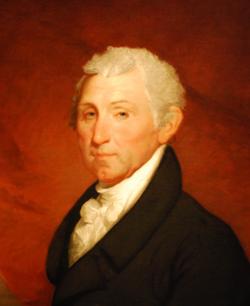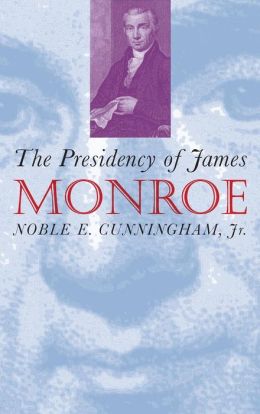Class! Who was the fifth Prime Minister of Australia?
Hum! Don’t know? Well, ignorance is no excuse. Write it down. Alfred Deakin served the fifth term, having done it earlier, and the fifth person to be sworn in as Prime Minister Andrew Fisher.
Now let’s try something harder. Who was the fifth president of the United States? What? James Monroe. Yes! That’s right. Did you peek at the heading? Of course.
 Monroe was the last president to bear arms in the Revolutionary War (1775-1783). While in the Continental Army he warned against the vulnerability of the fledging capital Washington D. C. and proposed defensive measures, which were rejected by the Secretary War at the time, one John Armstrong. The British burned Washington in August 1814 and in September 1814 Monroe was sworn in as his replacement.
Monroe was the last president to bear arms in the Revolutionary War (1775-1783). While in the Continental Army he warned against the vulnerability of the fledging capital Washington D. C. and proposed defensive measures, which were rejected by the Secretary War at the time, one John Armstrong. The British burned Washington in August 1814 and in September 1814 Monroe was sworn in as his replacement.
Great Britain was much distracted by Napoleon réchauffé and made peace. Monroe was one of the commissioners who negotiated that peace at Ghent in Belgium before Andrew Jackson’s name-making victory at New Orleans. Monroe’s military, administrative, and diplomatic experience together with the patronage of Thomas Jefferson put a presidential stamp on him. There was some talk he would contest the office earlier but he stood aside for another Jefferson favorite, the diminutive James Madison who served two terms. (Monroe had been Secretary of State, had negotiated the Louisiana Purchase, had been ambassador to Great Britain, to Spain, and much else.)
In 1816 Monroe’s time came. Though he was opposed because four the first five U.S. president had been from the Virginia Dynasty. (See if you can guess which is the odd man out.) Nonetheless, he was successful. At this time half of the state legislatures voted for candidates and then transmitted these votes to Congress. In the other half there was a popular vote which did not in all cases bind state delegates. If no candidate received a majority of electoral ballots, then the House of Representatives had a free vote. (All those idiots who idolize the Constitution as a sacred text without every having studied it, might consider this.)
In the event Monroe with the support of the outgoing President Madison and the living god Jefferson won. His re-election in 1820 was nearly uncontested, at least as much because the other major political party dissolved, the Federalists.
Monroe emerges from the pages of this book as a hard-working president who concentrated on foreign relations. This was an imperative because the United States was surrounded by European colonial powers. All were conscious that the United States offered an example of a successful rebellion against distant colonial masters that might be, and was, taken up elsewhere, particularly in Central and South American. There were the British in the Canada from coast to coast. The Russians had a toehold in the Pacific Northwest, while the Spanish claimed everything on the Gulf of Mexico from Florida to Texas, and all of the Caribbean Sea and California’s Pacific coast.
Monroe tried to divide these European neighbors with many separate negotiations. The Spanish were the weakest, and in time, thanks to the impetuous actions of General Andrew Jackson, they yielded Florida and the eternal supply of mosquitoes there.
Spanish weakness raised another specter and that was a French takeover. France rebounded from Napoleon’s second departure and its restored French Bourbon monarchy offered to regain Spain’s restive American colonies from Mexico, Cuba, Colombia, Argentina, and so on. The rumour was that Spain’s Bourbon monarch would transfer its American colonies to France, which would then dispatch a task force to raise the flag.
At the same time, an alliance between Prussia, Hapsburg Empire of Austria, and Russia was rumoured to be planning a move from Alaska into the Pacific coast to San Francisco.
There was a great deal of pressure on Monroe to support the several Latin American rebellions led San Martín, Simon Bolivar, Andre Marti. Monroe resisted this pressure and was criticized far and wide as a coward. (Nothing ever changes.) He was by no means sure how these rebellions would work out and if they failed, the Spanish with other European powers might take revenge on the United States which had proven incapable of defending itself in The War of 1812 a mere nine years ago and since Congress had cut military budgets by half every year… Yet the budget cutters in Congress called the loudest for a declaration of support for everyone, including Greece! (Nothing ever changes.)
Instead Monroe took his time and in a later State of the Union address he declared that the United States would not tolerate further European colonization in the Americas, nor tolerate a transfer of existing colonies to another European power. He was no Jefferson as a wordsmith, and the speech is guarded, qualified, indirect, and convoluted. The more so because the United States was hardly in a military position to enforce such an aspiration, it did by then, through some of those separate negotiations mentioned above, have a silent partner with such capacity and which partner did not want to see any other European power gain ground in the Americas. Class, see if you can infer which power that might be.
This assertion became known, thirty years later, as the Monroe Doctrine of the independence of the Western Hemisphere from Europe. It has been evoked several times since, by Teddy Roosevelt to warn off a German naval expedition to collect debts from Venezuela in 1904. Instead Teddy offered to broker an arrangement to deal with the debts which was accepted. The same had been done earlier (1865) and would be done later (1915) to impede French incursions into Mexico. Regrettably the Monroe Doctrine was also a cloak drawn over some unsavory shenanigans in Central America for two generations, and as a result became an object of resentment throughout Latin American by the time the Cold War came around. Then it was again cited, but by then its moral fiber was worn threadbare.
Monroe oversaw the reconstruction and furnishing of the White House after the British bonfire, and entertained in it at a punishing rate. Three to four dinners a week with 20-30 guests, a reception for 100 to 150 guests once a week. These occasions were all at his own expense but they were expected in a small town where there was little else to do. He was absolutely formal on these occasions. He did not particularly like this enforced society and he refused all invitations to visit others on the grounds of the dignity of the office. He was no communicator or glad-hander.
To manage the work of the office he made use of his family at no pay, his brother, his son, nephews, and cousins, while his wife and daughters managed the social side.
He maintained a strict neutrality in the election of his successor in 1824, which alienated all the candidates, John Quincy Adams, Henry Clay, Andrew Jackson, and John C. Calhoun.
Calhoun was his Secretary of War and he seems to have been a competent administrator with some strategic sense. It pains me to recognize any virtues in this violent and destructive man. It was his building program that led to the construction of Fort Sumter, later to be the flashpoint of the Civil War. Ironic that.
The petty bickering over personal and party preferment which characterizes Washington D. C. today has a long history. In 1817 when Monroe was to be sworn in the practice was for Senators to go the House of Representatives to witness the event in that chamber together with those who could fit into the public gallery once the Senators had been seated.
Henry Clay, a disgruntled candidate for president, was the Speaker of the House of Representatives. No friend of Monroe he. When the Senators proposed that they bring their own red leather chairs and put them on the floor to leave more room in the public gallery, Clay opposed this break with tradition. He was adamant, no red Senatorial chairs will ever sit in the House of Representatives!
Time pressed, and the result was to move the ceremony outside, where it has stayed ever since.
By the way, because of dispute over electoral ballots that changed nothing his second inauguration led to two days during which there was no president of the United States. Monroe’s first term, together with that of his Vice-President, expired on Friday 2 March per the Constitution at the time, but the dispute delayed his inauguration one day. For that one day, there was no one to exercise the presidential office. The succession arrangements in the Constitution at that time did not apply to such a problem. Then Monroe took the oath on Sunday, on which day it could not be communicated to Congress until Monday. The gap was then two days.
Monroe left office deeply in debt and the Congressional grant (in lieu of a pension) he had counted on covered less than half of it. He sold land and property (including tableware) to pay the rest. He died a poor man five years later, like Jefferson and Adams before him, on the 4th of July.

The volume is a part of series on presidents and it is confined to his presidency. Accordingly it does not mention at all Monroe’s support for the American Colonial Society’s efforts to transport freed blacks to West Africa, which became concentrated on Liberia, and in the city of Monrovia, as we know it today, which was given its name while Monroe was president.
The book is competent and thorough. It does stick rigorously to the presidency of James Monroe. It is not a biography then, and this reader got very little impression of Monroe the man, his family, his life before and after office. All of that is outside the remit of the series.
